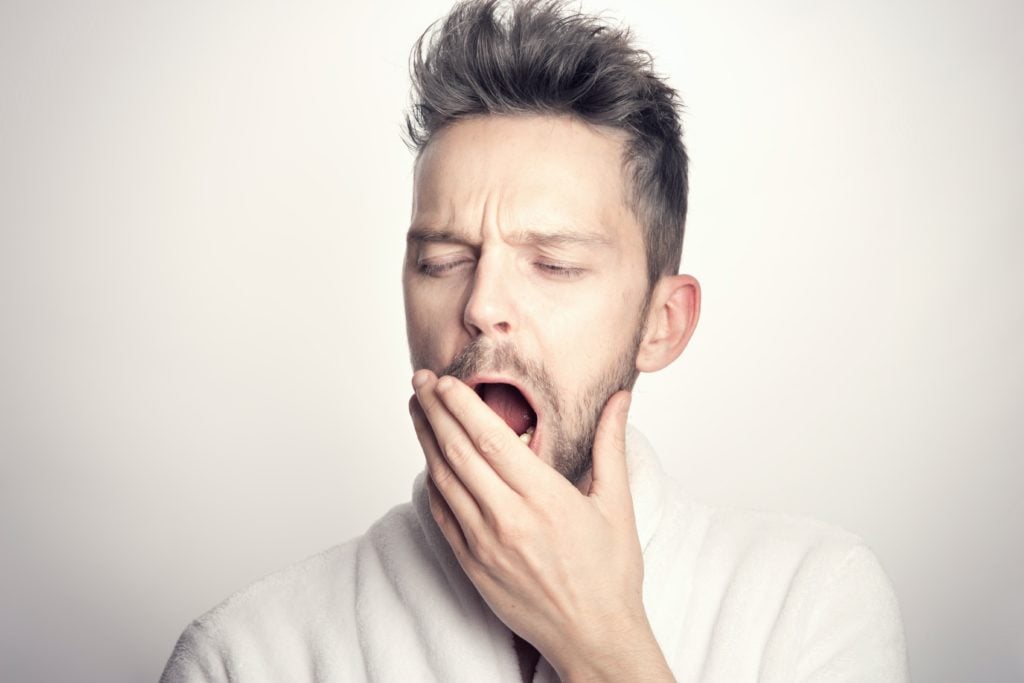12 Warning Signs Your Body Is Sleep Deprived

Whether work deadlines have you burning the candle at both ends, anxious thoughts are keeping you up, you’re adjusting to changes at home (e.g., a new baby or pet), or you got caught up in a late-night TV binge (why are some shows so addicting?!), virtually everyone has found themselves sleep deprived at one time or another. If you’re lucky, you can get a good night’s sleep the next night, quickly returning to normal. But for others, the condition can become so chronic, you may not even realize you’re suffering. You may even think you (uniquely) only need a few hours of sleep at night to get by.
Unfortunately, an estimated one-third of all American adults simply don’t get the sleep their bodies (and brains) need. 1 And that’s a problem that seems to only be getting worse. Just as a reminder, adults need between seven and nine hours of sleep each night. And children, as well as teenagers, need even more. 2
However, it’s not just about how many hours you spend in bed per night. Getting enough sleep means you’re getting good quality sleep, so you wake up refreshed and ready to take on the day. Sadly, it’s clear that doesn’t happen nearly enough. Up to 40% of adults have reported falling asleep during the day at least once per month—a strong indication of sleep deprivation. And up to 70 million Americans report chronic or ongoing sleep problems. 3
So, for example, if you sleep eight hours every night yet wake multiple times, interrupting usual sleep patterns, you can still be sleep deprived.
Common causes of sleep deprivation include:
- Poor sleep hygiene
- Lifestyle choices
- Work obligations or shift work
- Sleep disorders, including insomnia and narcolepsy
- Illness, such as common colds and flu
- Medical conditions, including sleep apnea and restless leg syndrome
- Certain medications
- Stress or anxiety
- Aging
- Changing schedules
- Disruptions due to a new baby or even a pet
- Environmental disruptions (e.g., when it’s too hot, too cold, too noisy, too bright, or the bed just isn’t comfortable)
What Are the Signs of Sleep Deprivation?
You don’t have to be drifting off during a meeting or on the couch at the end of the day to show signs of sleep deprivation. You don’t even have to be walking around feeling like a zombie. Signs of sleep deprivation can be more subtle than that. For example, with even a night or two of sleep disruptions, you can experience:
- Drowsiness and daytime fatigue
- Lack of concentration or attention
- Frequent yawning
- Slower thinking and ability to make decisions
- Slowed reaction times
- Memory issues
- Mood changes, such as increased irritability and anxiety 4
- Decreased strength
- Relationship stress
- Lowered sex drive
- Less resistance to infections
- Increased cravings for sweet, salty, and starchy foods
Even if you’re working through a boring task, you should easily be able to stay awake and alert, as long as you aren’t sleep-deprived. If you are sleep deprived, you may find yourself drifting off at unexpected times, such as nearly immediately when lying down or even just kicking back on the couch.
You may also experience “microsleeps” or drifting off during times when you are typically awake. Many people aren’t even aware they’ve drifted off, which can be exceptionally dangerous if driving or running equipment. 5 Others may have woken ourselves up by snoring at the end of a yoga session.
Even after missing only one good night’s sleep, you can feel drowsy and foggy, lack energy, or wake up feeling irritable.
The effects of chronic sleep deprivation are much worse, though, heightening the risk of physical and mental health issues long-term. That includes increased risk for:
- Car accidents and other injuries
- Infections
- Heart disease
- Asthma attacks
- Kidney disease
- High blood pressure
- Diabetes
- Stroke
- Obesity
- Increased pain sensitivity
- Hormone imbalances
- Decreased coordination and physical balance for a higher risk of falls
- Dementia
- Depression
- Severe mood swings and impulsivity
- Mental illness
- Long-term insomnia can lead to hallucinations, paranoia, and even suicidal thoughts 3, 6 – 12
Sleep deprivation can make you less productive, interfere with school, work, social functioning, and more. So, it’s not surprising that sleep deprivation can even lead to early death as well as decrease quality of life. 13, 14
Now that you know and understand the symptoms, you’re in a better position to give your body the sleep it needs and that you deserve. Start by addressing your sleep hygiene, creating a nighttime routine, supporting a healthy circadian rhythm, and perhaps practicing sleep meditation.
If you continue to experience signs of being sleep deprived, it’s time to schedule a visit with your doctor or healthcare practitioner who can refer you to a sleep specialist. They can then work with you, especially if you may have a sleeping disorder like sleep apnea, either obstructive (more common) or central (fairly rare), to set up a sleep study and perhaps prescribe a CPAP (continuous positive airway pressure) machine.
Being sleep deprived isn’t something to just live with as it has long-term, very detrimental consequences. Instead, it’s vitally important to address the causes of your sleep deprivation and conquer your sleep debt by prioritizing quality sleep. It really is one of the most important aspects of living a healthier, happier life.




 7 Signs Your Body is Seriously Low on Collagen (not just wrinkles)
7 Signs Your Body is Seriously Low on Collagen (not just wrinkles) Health Expert: "Turmeric Doesn't Work (unless...)"
Health Expert: "Turmeric Doesn't Work (unless...)" 3 Warning Signs Your Probiotic Supplement is a Total Waste
3 Warning Signs Your Probiotic Supplement is a Total Waste

